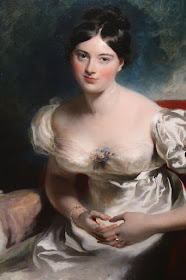Located in an elegant eighteenth century mansion, the Wallace Collection houses one of the finest collections of art in London. Once described as “the greatest picture gallery in Europe” by art historian and critic Kenneth Clark, the Wallace Collection is renowned for its exceptional collection of fine and decorative arts from the fifteenth to nineteenth centuries with important French eighteenth century paintings, exquisite furniture, Medieval armour and weaponry, porcelain and Old Master paintings arranged in 30 sumptuous rooms and galleries of Hertford House. Established in 1897 from the private collection mainly created by Richard Seymour-Conway, 4th Marquess of Hertford, who left both it and the house to his illegitimate son Sir Richard Wallace, it was bequeathed to the British nation in 1897 by his widow, and has been open to the public as The Wallace Collection since 1900.
With room after superb room containing Louis XIV and XV furnishings and the richest collection of 18th-century Sèvres porcelain in the world, highlights of the painting collection include Franz Hals's iconic 'Laughing Cavalier', Poussin’s 'A Dance to the Music of Time' and Fragonard’s 'The Swing' as well as important gems by Titian, Rembrandt, Velázquez, Fragonard, Van Dyck, Canaletto, Watteau, Gainsborough and Reynolds. Of particular note is the outstanding collection of inlaid furniture by André-Charles Boulle, who was cabinetmaker to Louis XIV and christened by his contemporaries as "the most skillful artisan in Paris". Adorned with dramatic chandeliers, magnificent drapery, silk damask wall coverings and stunning architectural details, Hertford House is preserved entirely as it was bequeathed, enshrining the Francophile tastes of nineteenth century English aristocracy, so that exploring this treasure trove of priceless art amid such sumptuous interiors, is a truly magnificent experience not to be missed.
The Entrance Hall and main staircase of Hertford House
Old photograph of Sir Richard Wallace at Hertford House
The Wallace Collection restaurant is a lovely French-style brasserie run by Peyton & Byrne located in a large atrium flooded with natural light from the skylights above
Arriving just as The Wallace Collection was opening, we were in need of a cappuccino, freshly squeezed orange juice and a warm croissant
Hot frothy cappuccino
Hot croissant with butter and jam
The Billiard Room, which originally had an enormous billiards table, is a showcase for some of the best furniture by André-Charles Boulle, christened by his contemporaries as "the most skillful artisan in Paris"
Gilt bronze mount on André-Charles Boulle wardrobe from 1715
Detail of Boulle's exquisite marquetry of tortoiseshell and bronze
The most famous French cabinetmaker and preeminent artist in the field of marquetry,
Boulle was cabinetmaker to Louis XIV, during whose reign France became pre-eminent in the arts
Boulle’s inlay materials included tortoiseshell, brass, pewter and even animal horn, and for contrasting woods, he often used rosewood, ebony, kingwood, and other dark-toned tropical species
Mantel clock made with turtle shell, ebony, and rosewood with brass and gilt bronze mounts of Venus and Cupid produced in Boulle's workshop in 1715
The sumptuous Back State Room houses the family's collection of spectacular Sèvres porcelain
Pot-Pourri Vase from 1761
Elaborate Vase with Elephant Candle Holders was originally purchased by Madame de Pompadour in 1759, and was displayed in the apartment at Versailles
'The Dead Wolf' detail by Jean-Baptiste Oudry (1686-1755)
Countess of Blessington by Sir Thomas Lawrence, 1822
The 'Boudoir Cabinet' gallery devoted to miniatures, small paintings and gold boxes
dating from the mid-16th to the late 19th centuries
Icelandic Drinking Horn from 1650, made from bullhorn and silver and inscribed "Mead to the Memory"
Medieval Field Armour from 1480, is the most famous of its type in the world,
and displays the full harness of Knight and Horse
The West Gallery is hung densely, as was characteristic of Sir Richard Wallace's lifetime, with paintings by nineteenth-century artists
Polichinelle by J.L.E. Meissonier (1815-1891)
Cupid and Psyche by Filippo della Valle, 1732
The Large Drawing Room with Boulle furnishings set off by lush wall coverings
In addition to the exquisite furniture, paintings and porcelain,
even the silk drapery and tassels are just beautiful
The Judgement of Paris by François Boucher
Jupiter and Callisto from Ovid's Metamorphoses by François Boucher, in which the god Jupiter disguised as the moon-goddess Diana, seduces the nymph Callisto
The Swing by Jean-Honoré Fragonard, the undisputed King of Rococo
The Lacemaker by Caspar Netscher (1639-1684)
The beautiful Dutch Galleries in the East Wing with rich blue silk walls
One whole room in the gallery is devoted to Rembrandt
Rembrandt's Self Portrait in a Black Cap, 1637
The Persian Sibyl by Domenico Zampieri
Saint John the Evangelist's Vision of Jerusalem by Alonso Cano
Although we had the museum to ourselves arriving as it opened,
The Wallace Collection gets a little busier as the day progresses
After a two-year £5 million refurbishment in 2014, the Great Gallery has one of the finest collections of Old Master paintings in the world including Rubens, Velazquez and Titian
The Laughing Cavalier by Frans Hals - "he is neither laughing nor is he a Cavalier"
Flowers in a vase by Jan van Huysum, 1726
Peacocks and Ducks by Melchior d'Hondecoeter, Netherlands, 1680
Imperial Wine Cup from China decorated with pearls, precious stones and Kingfisher feathers
were made for the Qianlong Emperor
Gold Trophy Head from Ghana was acquired by Wallace in 1874 for £500
Italian sixteenth-century maiolica was made in 1525 in Maestro Giorgio Andreoli’s workshop in Gubbio
Detail on the reverse of the plate with artists signature and date
'The Good Shepherd' from India made with rock crystal, gold rubies, emeralds and sapphires,
purchased by Wallace in 1876 for £100















































No comments:
Post a Comment